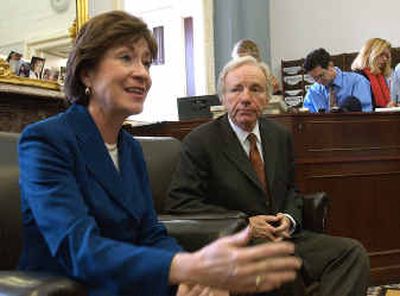Intelligence bill is test for Bush

WASHINGTON – A showdown in Congress this week over plans to overhaul the nation’s intelligence network is shaping up as a crucial test of President Bush’s clout and his approach to governing in his second term.
Lawmakers are watching to see whether Bush will use the full force of his office to win congressional support for legislation that would put the government’s entire intelligence apparatus under the control of a powerful new national intelligence director. So far he hasn’t. The proposal has stalled in Congress because of resistance from Republicans in the House of Representatives.
With time running out before lawmakers adjourn for the year, Bush has two paths to legislative victory: force his fellow Republicans to fall in line or reach out to Democrats to cobble together a bipartisan majority.
On Saturday, the president devoted his radio address to the intelligence bill and urged Congress to pass the bill. Members were anticipating a letter from Bush that would detail his desires for the legislation while reassuring opponents in his own party.
The president initially seemed content to let the legislation die, but public pressure and lobbying by the bipartisan Sept. 11 commission have pushed him to be more outspoken about his support. The plan for an intelligence director is part of a far-reaching intelligence restructuring that the independent commission recommended after its investigation into the terrorist attacks of Sept. 11, 2001.
Supporters of change worry that this week may be their last chance to get the bill through Congress. Although lawmakers could take up the issue again after a new Congress convenes next year, momentum for the complex overhaul is likely to dissipate over time.
“The president has put his position, his prestige, his credibility, on the line on this bill. This is the first test of that after his re-election,” said former Democratic Rep. Lee Hamilton of Indiana, a co-chairman of the Sept. 11 commission. “I don’t think the president wants to take a defeat.”
Not everyone in Bush’s administration shares the president’s declared enthusiasm for the intelligence restructuring. Resistance is particularly strong at the Pentagon, where officials want to retain exclusive control over military intelligence operations.
Gen. Richard Myers, the chairman of the Joint Chiefs of Staff, publicly withdrew his previous reservations about the bill Thursday, but that didn’t resolve all the issues raised by its opponents.
As much as 80 percent of the annual intelligence budget goes to military intelligence. The proposed overhaul would put all 15 government intelligence agencies, including the CIA and military intelligence units, under the new national intelligence director. The legislation also would create a national counterterrorism center to coordinate the government’s response to global terrorism.
“The American people will be safer if we get the provisions of this bill into law, and they’ll be less safe if the Congress goes home without doing it,” said Thomas Kean, the commission’s other co-chairman and a former Republican governor of New Jersey.
Bush reaffirmed his support for the changes Tuesday during a trip to Canada.
“Let’s see if I can say it as plainly as I can. I am for the intelligence bill,” he said.
The overhaul package passed the Senate by 96-2 on Oct. 6, but House Speaker Dennis Hastert, R-Ill., blocked a House vote in deference to the two leading Republican opponents and their allies.
Hunter, reflecting concerns at the Defense Department as chairman of the House Armed Services Committee, doesn’t want to dilute the Pentagon’s control over military intelligence. He’s vowed to stand up to presidential pressure, saying he’s more concerned about doing the right thing for people such as his son, a Marine lieutenant who’s served two tours in Iraq.